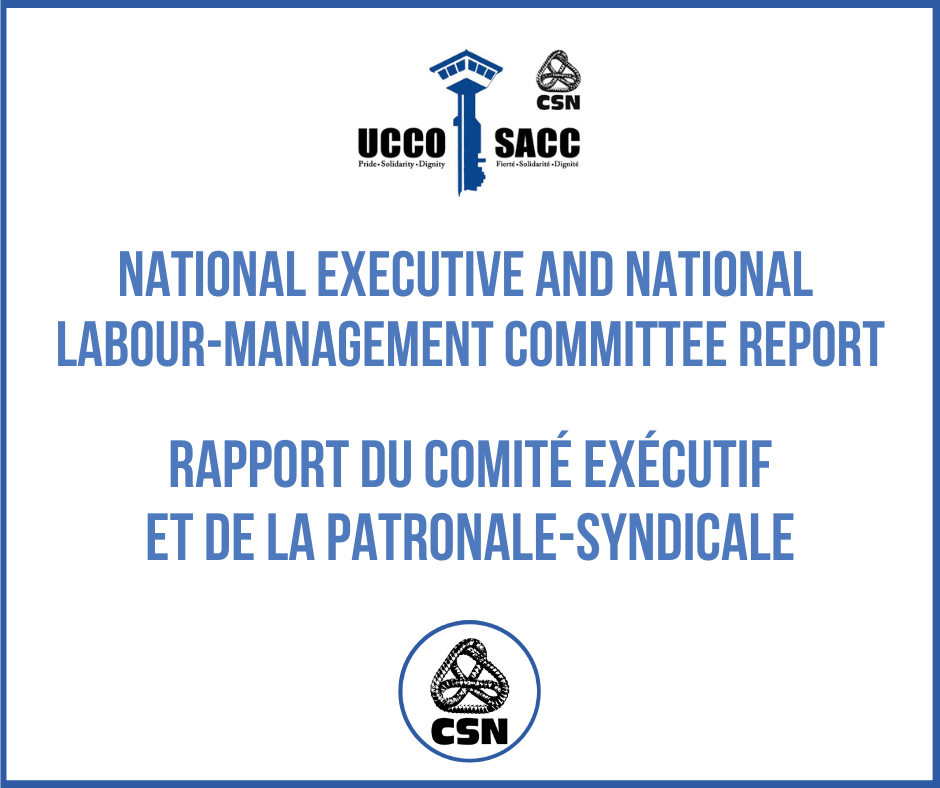The National Executive and National Mobilization Committee were in Ottawa the week of April 28 to May 3, accompanied by Kareem Zacharia from Collins Bay Institution who observed both tables for the week. The executive committee would like to thank Kareem for his presence and input. Both tables had a very full agenda. The Labour Management meeting, also held that week, was attended by the Regional Deputy Commissioners, which typically occurs only once a year. The state of regional labour relations was discussed, with a focus on good practices and ongoing regional issues. It is always interesting to note how differently issues are handled across the employer’s five regions.
Here are some key highlights from the week:
April 28, 2024
On the National Day of Mourning for those killed or injured in the workplace, more than 60 officers came to Parliament Hill to hold a 24-hour vigil to raise awareness among citizens and MPs regarding our unique working conditions. We observed a minute of silence to honour our comrades who have been injured or killed in the line of duty. We heard speeches from our national and regional elected representatives as well as from CSN President Caroline Senneville. It’s important to make it clear to both the government and our employer that our workplace is unique. The violence we experience daily is unknown elsewhere in the federal public service. We will continue to compile statistics on the assaults we face. Violence is not, and will never be, a normal condition of employment.
Shotgun Training
Several years ago, the employer made a recommendation to train CX‑2s in institutions that were considered remote, as immediate needs for an emergency response could not be met by deploying staff from other institutions. Since the pandemic, the employer has failed to meet the training requirements under the National Training Standards, and the union has signalled that the commitments the employer had made for remote sites were being ignored. Since this issue was raised, the employer, in its efforts to save a dime, made a presentation to EXCOM to reverse its commitment, and a decision was made to train only CX‑1s and IERT in all medium and maximum-security institutions. Despite “consultation” with the union, the employer has once again made a decision that may jeopardize staff, inmates, and public safety so as to save money. The CSN’s legal department has been mandated by the executive committee to assess our legal recourse, as we are still in a freeze regarding our working conditions as we are currently in negotiations, and we believe that the employer is on the wrong track with this issue.
Schedules
As previously reported, the employer has rescinded the scheduling bulletin it amended last May. The amendment, which had been a clear change to our working conditions while we were involved in negotiations, resulted in the union filing an unfair labour-practice complaint (190). It was made very clear by the Commissioner that, in the wake of rescinding this bulletin, sites would be free to develop schedules jointly, and schedules with 9-hour shifts would be accepted, which resulted in the withdrawal of our complaint with the board. At the Senior Executive Committee meeting, the union made it clear to all present that we were ready to present our new schedules, to reflect the current site deployment levels. We emphasized the view that sites do not seem ready to discuss schedules at their local committee meetings, since the withdrawal of this bulletin. We find it very difficult to understand the employer’s strategy in this matter. We also signalled to the employer that the window for approving schedules and putting them into production after the peak holiday season is closing. We ask that all local scheduling reps attend their local scheduling committee and put their developed schedules on the table to be signed by the employer and sent to the National Scheduling Committee for approval, along with the agreed-upon date for production.
Medication Distribution
At the last NLMC meeting in April, we tabled several issues with the new Deputy Commissioner of Health regarding the medication-distribution guidelines. We signalled that we do not agree with Direct Observation Therapy medication being placed in lock-boxes for after-hours consumption by inmates. The DC of Health signalled to the executive committee that she would discuss our issues further with our subcommittee on health. The executive committee remains steadfast on the issue of hiring more nursing staff to extend the hours of our institutional healthcare department. It is not a Correctional Officer’s job to deliver medication or be accountable for it in our institutions. We also cast light on the serious issue of the diversion of medication, and the growing trend in our healthcare departments of failing to report inmates who divert medication. Our subcommittee will also work with the healthcare sector to find effective and workable solutions for the health and safety of us all. Drug diversion, combined with the current opioid crisis, is a dangerous practice that has a pernicious impact, including an ever-increasing number of overdoses and worsening institutional violence.
Needle Exchange Program
Explaining our position on needles in prison cells is getting very old with an employer who seems ignorant both of the risks to health and safety and the program’s failure. As some may have noticed, this issue has been a topic of conversation in the House of Commons, as the union has been trying hard to make our lawmakers understand the program’s failure. Understanding that the opioid crisis is also a prevalent condition within our institutions, the Service needs to dedicate resources to keeping drugs out of prison instead of condoning their use. In recent weeks, Bowden Institution initiated the program despite resistance from nearly every staff member and, this month, it is expected that consultation will occur with the Federal Training Centre in Québec. Each of these facilities has submitted a detailed report to the employer on the reasons an Overdose prevention program would be a much safer option than the PNEP. Unfortunately, these reports have fallen on deaf ears, and the employer continues to push the option that is cheaper. Through access to information, we also continue to work actively to determine the true mandate of Dr. Kronfli of McGill University who has been contracted by the CSC to evaluate the PNEP. We expect the CSC will soon convene our subcommittee to put forward this year’s rollout plan. We will continue to mobilize on this issue, as it is important to Correctional Officers.
Detention of High-risk Immigrants
In its 2024 Budget, the government has proposed to introduce amendments to the Corrections and Conditional Release Act (CCRA) and the Immigration and Refugee Protection Act to enable the use of federal correctional facilities for the purpose of high-risk immigration detention. A general conversation took place during the Senior Executive meeting on this government proposal. While there does not seem to be any idea on the employer side as to what this would look like operationally, the executive committee made it known that immigrants who have not been federally sentenced do not belong in prisons with the country’s most violent offenders. As control regarding these immigrants falls outside of the Service’s mandate, it was made clear that the Border Services Agency is not welcome to serve its mandate within our operational environment. This proposal obviously would come with consultation with stakeholders in various parliamentary committees, and UCCO will say its piece if these committees are tasked with any amendment to the CCRA. More to come on this issue.
In solidarity,
Your National Executive

